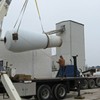
Stitzer Crane Service was established in 1988 to provide the area with personalized crane services at affordable rates. Through the years, our locally, family-owned-and-operated company has continued to stay committed to service and value. We are also an equal-opportunity employer that works with both the private and public sectors to provide the services for your commercial, residential, industrial, or public project needs. We have more than 25 years of experience, so we have the knowledge and skills to get the job done right the first time.
For all your crane service needs, turn to Stitzer Crane Service Company in State College, Pennsylvania. Our crane company has a wide range of equipment available for your task. Our equipment selection includes cranes, rigging, and concrete buckets.
You might have heard that steel buildings are faster to construct, but have you wondered exactly how much faster? It’s a pretty big difference. Small buildings that would normally take weeks can be built in days, and buildings that would take months can be built in weeks.
Did you know that an important development in crane design was introduced during the Middle Ages? Here, a horizontal arm known as a "jib" was added to the boom, allowing for an increased range of motion.
Structural steel is able to enhance construction productivity and speed up the overall construction process due to the prefabricated nature of the materials. Shop fabrications ensures the consistent maintenance of tight construction tolerances.
The School of the Art Institute of Chicago (SAIC), which teaches welding to art students, notes that “Oxy-acetylene, commonly known as oxy-fuel, is one of the oldest welding processes … [and it] is still widely used for a variety of applications.”
In 1869, welding technologies, tools, and techniques were still evolving. An English company wanted 20 welded boilers, but the work was sent to Belgium because skilled welders were a rarity and no English firm would take the job.